Are you prepared to take control of your energy bills and adopt a greener lifestyle? Enhancing your home’s energy efficiency is crucial for both comfort and the environment. By understanding your energy usage and implementing effective strategies, you can cut down on costs and help the planet. Homeowners in the United States are urged to embrace systems that support an energy-efficient lifestyle, setting the stage for a sustainable future.
Key Takeaways
- Effective energy use can lead to substantial savings on your bills.
- Understanding energy consumption is the first step towards efficiency.
- Embracing eco-friendly living benefits both your wallet and the planet.
- Implementing energy-saving strategies can create a positive impact at home.
- Home Energy Rebate Programs in Michigan can aid in financing upgrades.
Understanding Home Energy Use
Understanding your home’s energy use is key to managing energy effectively. The average American household uses around 1000 kWh monthly. This usage significantly impacts energy bills and overall efficiency. Key areas like heating, cooling, lighting, and appliances offer chances for improvement.
For example, heating and cooling use over 52% of home energy annually. By recognizing how energy moves through your home, you can pinpoint ways to cut waste. Using energy-efficient lighting can slash lighting energy use by 50% to 75%. Enhancing insulation and sealing gaps around doors and windows can save 5% to 30% annually.
Understanding *vampire loads*, or energy used by devices when not in use, reveals more savings opportunities.
Tools like smart meters and home energy management systems make tracking energy use simpler. These tools help you plan energy use to lower costs. Utilities often offer programs that reward using energy during off-peak hours with rebates or lower rates. Improving energy management not only cuts costs but also reduces pollution from non-renewable sources.
Benefits of a Home Energy Audit
Conducting a Home Energy Audit offers numerous advantages for homeowners aiming to boost their energy efficiency. This assessment pinpoints areas where your home might be consuming energy inefficiently, resulting in wasted resources and elevated utility bills. By grasping the energy audit benefits, you gain the power to make strategic choices for enhancing your home’s performance.
What to Expect During an Energy Audit
A professional auditor scrutinizes your home’s various components during an energy audit, focusing on insulation, appliances, and HVAC systems. You can anticipate a detailed inspection that uncovers air leaks around windows and doors and assesses insulation efficacy. The auditor might suggest solutions like weatherstripping and caulking to bolster insulation and cut down heating and cooling expenses. By tackling these concerns, you can elevate your home’s comfort and drastically lower your monthly energy bills.
Finding Professional Auditors
Locating professional auditors for your energy efficiency evaluation is relatively easy. Homeowners can start by reaching out to local utility companies, which frequently offer programs to link you with certified auditors. HVAC experts might also provide energy audit services, ensuring you receive advice from specialists on optimizing your home’s energy consumption. Engaging a proficient auditor will reveal the vast potential for energy savings.
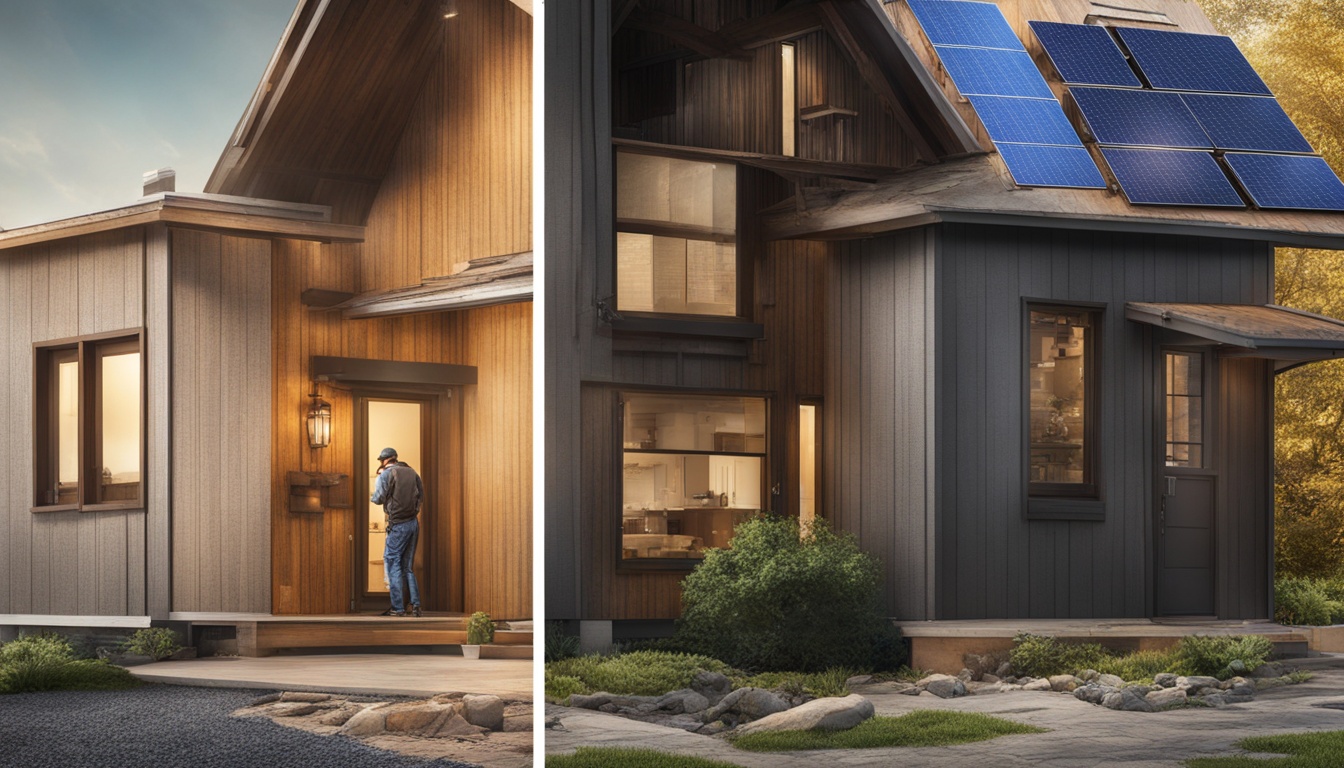
Home Energy Saving Strategies
Effective home energy saving strategies can boost comfort and cut energy bills. Start by tweaking your thermostat settings. Even slight changes can lead to big savings and better efficiency.
Adjusting Your Thermostat Settings
Optimal thermostat settings are key to managing energy use. Consider setting your thermostat at 80 degrees or higher when it’s hot. This approach not only keeps you comfortable but also cuts energy use when it’s hottest.
Every degree change, up or down, affects your energy use a lot. Remember, a one-degree drop in winter can up your energy use by 6 to 8%. So, small adjustments can make a big difference.
Utilizing Natural Ventilation
Natural ventilation is another way to cut energy use. Open windows during cooler times to let in fresh air, reducing air conditioning needs. Cross-ventilation by opening windows at opposite sides can enhance air quality and keep your space comfy without using much energy.
Think about using energy-efficient window coverings to block heat in summer. These steps can help you save energy and support the environment.
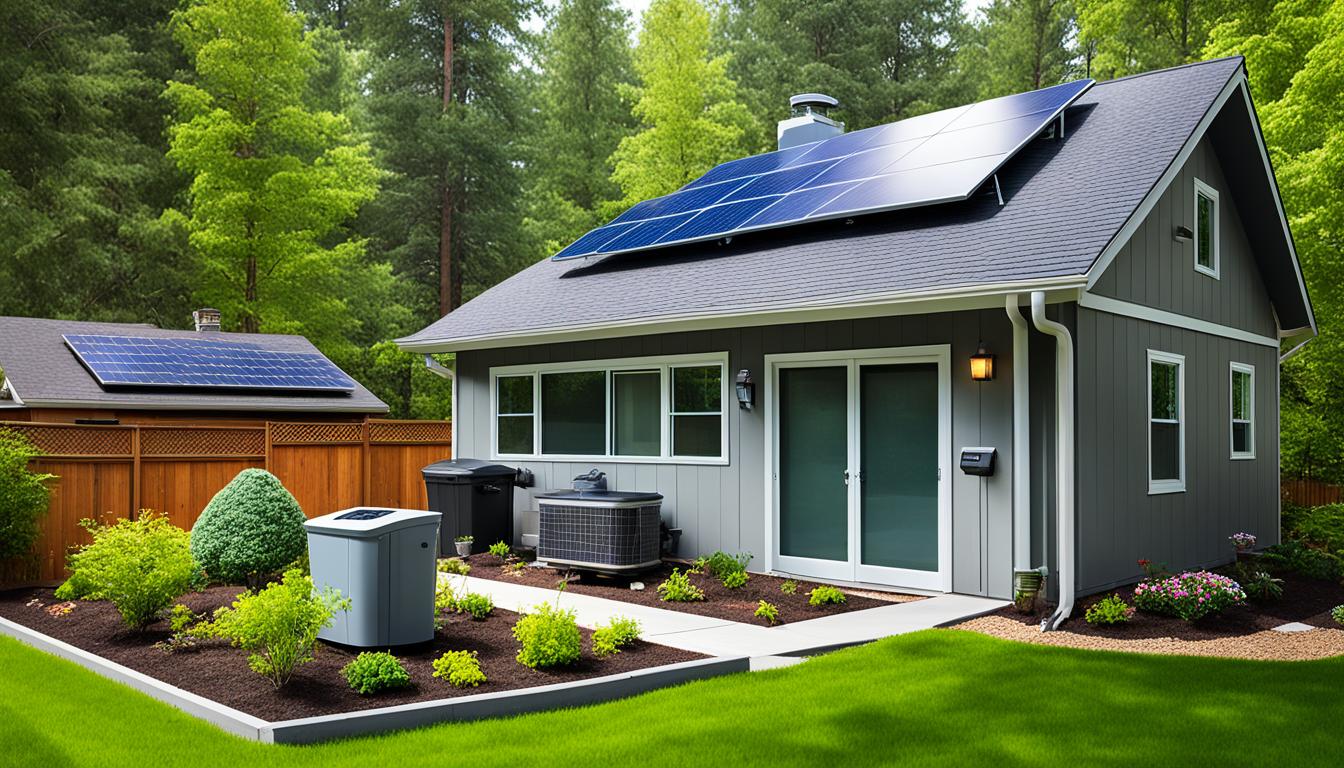
By optimizing these elements, you can save energy at home and help the planet. For more tips on making your home energy-efficient, check out effective strategies to manage energy better at home.
Energy Efficient Appliances: A Smart Choice
Switching to energy-efficient appliances can significantly cut down your home’s energy use and utility bills. By opting for appliances with the ENERGY STAR® label, you boost your home’s value and see notable savings on utilities. These appliances use less energy but still perform as well as older models, reducing your bills by 10 to 50 percent.
Identifying ENERGY STAR® Rated Products
When you’re in the market for new appliances, seek out ENERGY STAR® rated products. These products meet the U.S. Environmental Protection Agency’s strict energy efficiency standards. You’ll find refrigerators, washing machines, and dishwashers with advanced technology, including Wi-Fi connectivity, ideal for today’s lifestyles. For instance, energy-efficient refrigerators use between 350-550 kWh annually, resulting in significant long-term savings.
How Upgrading Appliances Saves Money
Adopting energy-efficient appliances can yield substantial savings on utilities. For instance, energy-efficient washing machines can cut energy use by up to 50% with features like load sensing technology. Moreover, ENERGY STAR certified dryers and dishwashers can reduce energy consumption by up to 20%. This investment not only leads to immediate cost savings but also enhances your home’s appeal if you decide to sell. Delve deeper into financial strategies with tools at personal finance tips for wise investing.
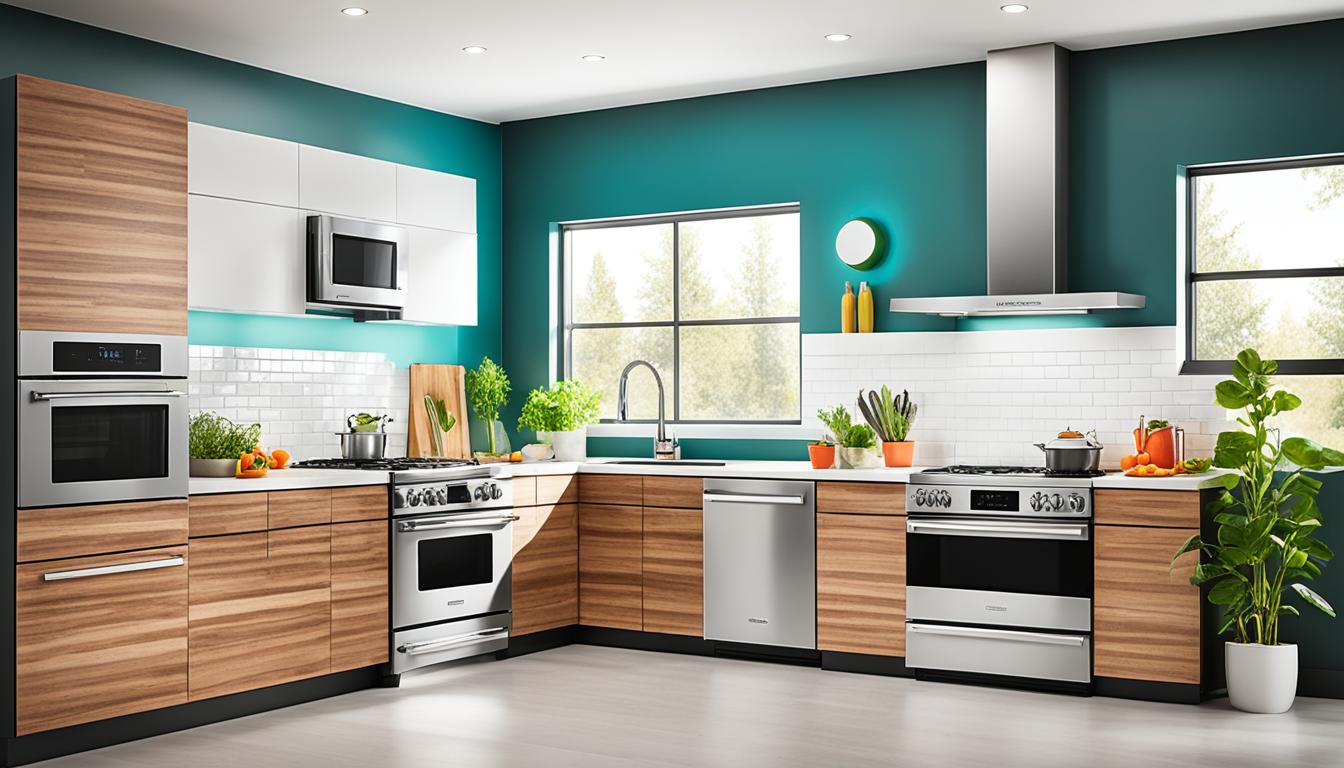
Simple Tips to Reduce Energy Consumption
Starting to reduce energy consumption is as simple as adopting a few daily habits. These habits can lead to substantial savings over time. Begin by turning off devices like televisions and computers when they’re not in use. This action minimizes unnecessary electricity use. Additionally, unplugging chargers and electronics when not charging enhances your efforts to save energy.
Turning Off Unused Devices
A key tip for saving energy is to turn off devices when they’re not in use. This habit not only cuts down on energy waste but also helps lower your energy bills. Standby power, or phantom energy, makes up a significant part of residential energy use. By switching off appliances, you can greatly reduce energy consumption at home.
Using Timers and Smart Plugs
Using timers and smart plugs can make managing energy use straightforward. These tools let you set schedules for when appliances turn on or off, ensuring energy is used efficiently. For instance, you can set your coffee maker or evening lights to operate at specific times. By doing so, households can save up to $100 annually, making energy-efficient living both simple and advantageous.
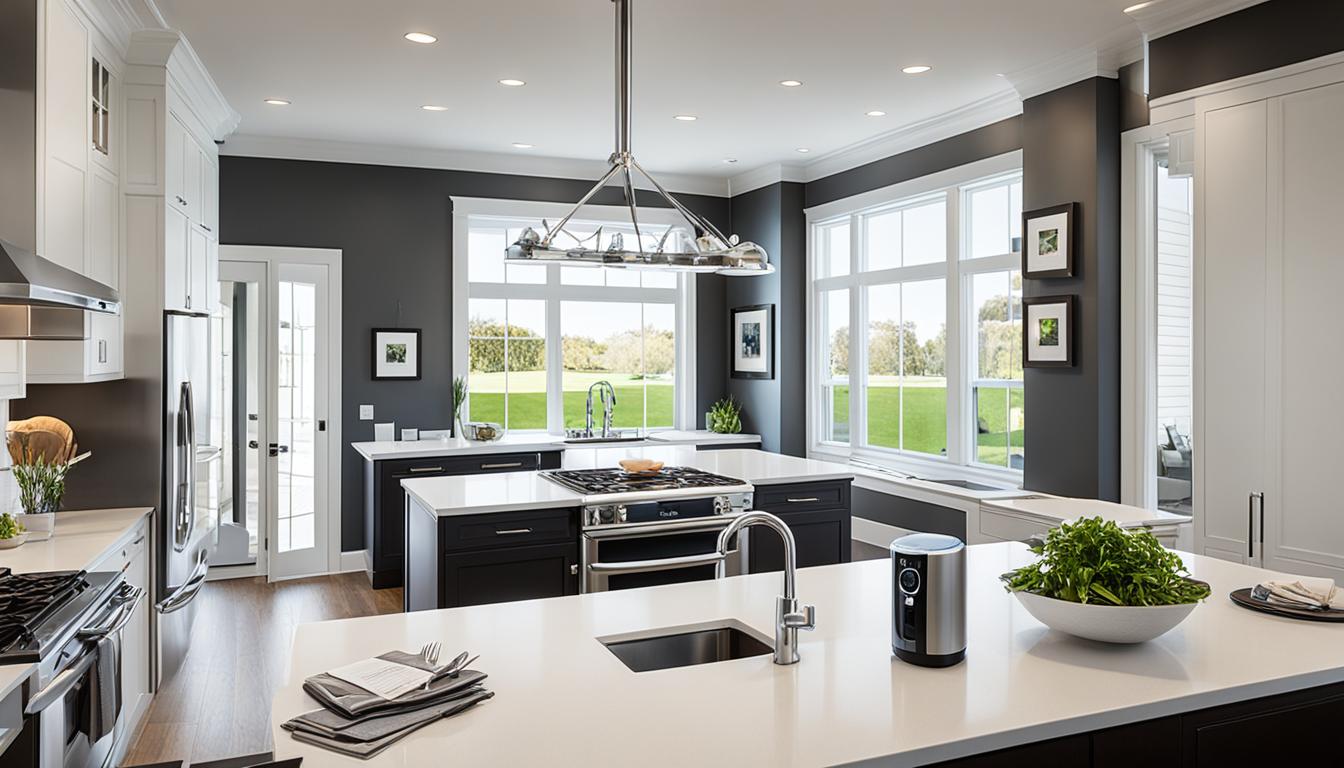
Eco-Friendly Living: Sustainable Choices
Embracing eco-friendly living can significantly contribute to creating a healthier planet while enhancing your home’s energy efficiency. By adopting sustainable home practices, you not only protect the environment but also improve your living space’s comfort and functionality. Simple adjustments in daily habits make a substantial impact.
For instance, utilizing energy-efficient appliances, such as those certified by Energy Star, ensures that your household consumes less energy. These appliances adhere to rigorous efficiency standards set by the U.S. Department of Energy. Opting for green home improvements like installing double or triple-glazed windows greatly mitigates heat loss and reduces noise, leading you to save energy year-round.
Implementing water-saving plumbing fixtures, including WaterSense labeled toilets, can decrease your water usage by 20% to 60% annually. This translates to significant savings on water bills while conserving precious resources. Another area where you can make a difference is with heating systems. Consider upgrading to modern condensing boilers that are 25% more energy-efficient than older models.
By making conscious choices aligned with eco-friendly living, you can minimize your ecological footprint and contribute to a sustainable future. The journey toward a more mindful lifestyle combines various small yet impactful practices that lead to long-term benefits.
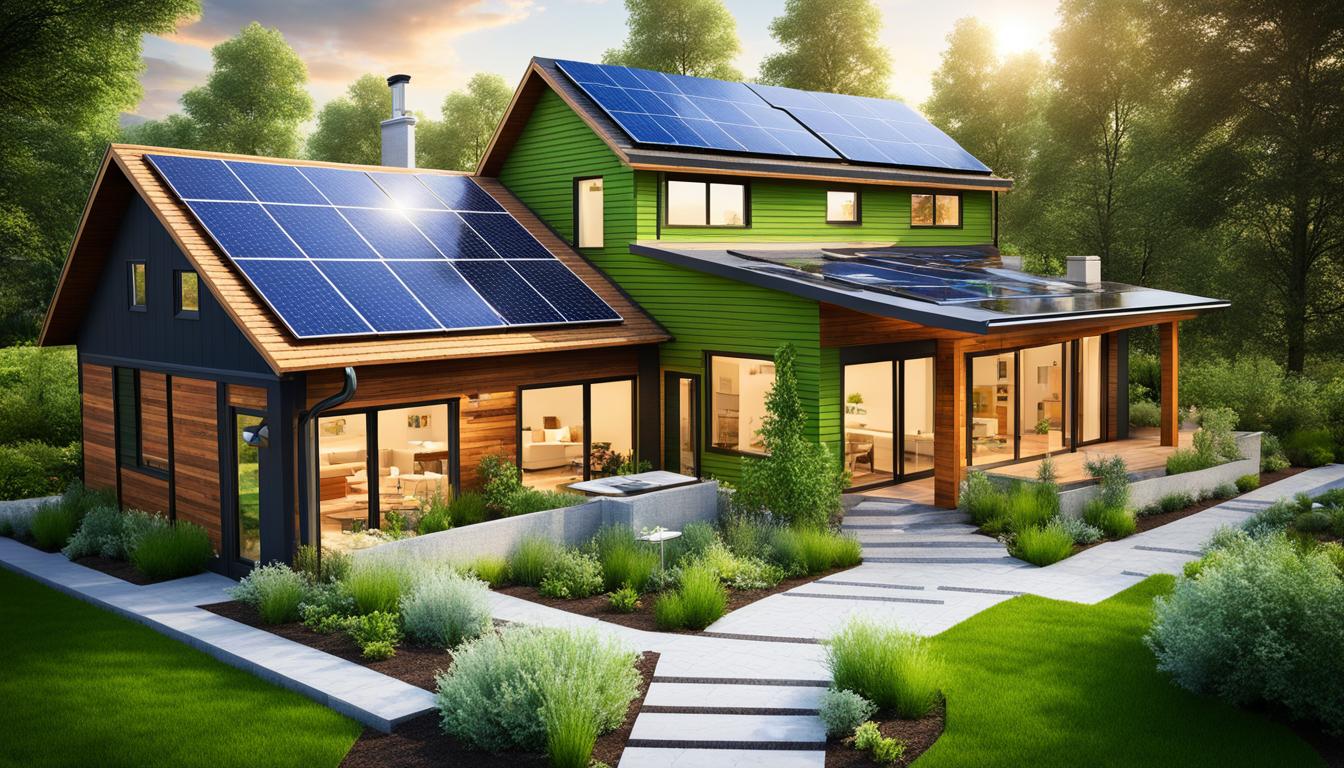
Investing in Energy-Saving Upgrades
Investing in energy-saving upgrades boosts your home’s efficiency and cuts energy costs over time. It focuses on better insulation and sealing gaps, making your home more comfortable and reducing bills. Many homeowners don’t realize how much energy is lost in homes that are not well-insulated. Studies show that up to 90% of American homes lack sufficient insulation.
Insulation and Sealing Gaps
Insulation acts as a shield against heat loss, making your heating and cooling systems work better. Sealing gaps around windows, doors, and openings stops air leaks that waste 25-40% of your home’s heating and cooling energy. By investing in quality insulation and sealing gaps, you can save between 35-71% on your energy bills.
Upgrading Heating and Cooling Systems
Switching to high-efficiency heating and cooling systems can greatly reduce your energy use. Air-source heat pumps, for example, use about one-third of the energy traditional systems do. These systems not only cut your utility bills but also increase your home’s value by 4.3% to 7.1% when you sell it. Tax credits and rebates often come with these upgrades, making them more attractive.

Renewable Energy Solutions for Your Home
The shift towards renewable energy is revolutionizing how we consume energy at home. Homeowners are increasingly embracing sustainable energy sources to boost energy efficiency and cut down on utility bills. This section delves into the benefits of solar panels and wind energy, highlighting how these technologies can make your home more eco-friendly.
Solar Panels: An Introduction
Solar panels are a favored option for homeowners looking to switch to renewable energy. These systems turn sunlight into electricity, offering a clean and dependable energy source. The upfront cost for solar panels is substantial, about $21,000 for a 7-kilowatt setup. Yet, they can produce 20 to 35 kilowatt-hours of electricity daily. Moreover, net metering rules allow homeowners to sell surplus energy back to providers, speeding up the payback period.
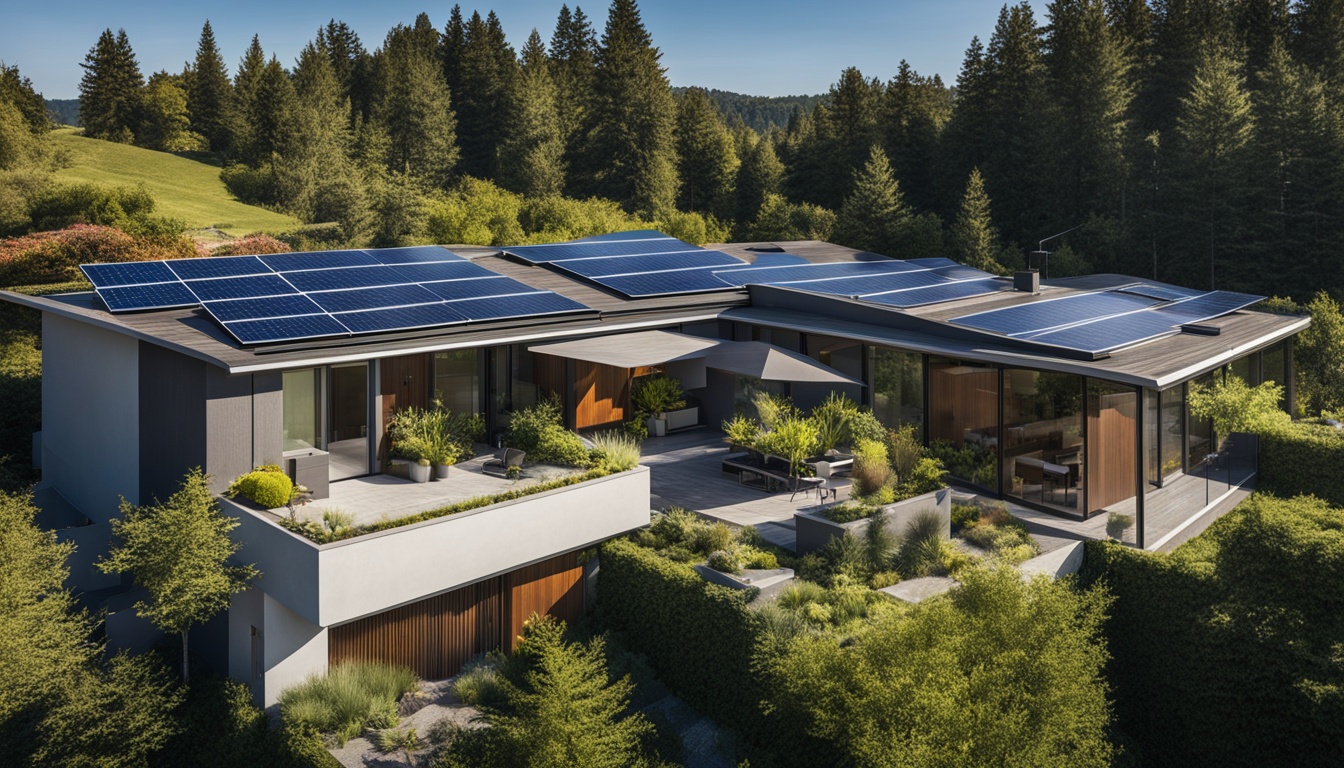
Benefits of Wind Energy
Small wind electric systems are another viable renewable energy option. Installation costs vary widely, from $10,000 to $70,000, based on specific conditions. Wind energy offers significant advantages, including less dependence on conventional power and lower energy bills. Homeowners can also consider hybrid systems that combine solar and wind power for enhanced efficiency.
For deeper insights and expert advice on eco-friendly savings, check out eco-friendly savings strategies. Investing in renewable energy not only supports sustainability but also improves your home’s energy efficiency.
Energy Conservation Tips for Everyday Life
Adopting energy conservation tips in your daily life can lead to substantial savings. Key areas like water heating and laundry practices benefit greatly from efficiency. By employing strategies in these areas, you enhance your home’s energy efficiency and support a sustainable lifestyle.
Water Heating and Conservation Techniques
Water heating is a significant factor in your energy bills. Reducing your heater’s temperature to 120°F prevents scalding and still ensures comfortable hot water for everyday needs. An Energy Star-certified heat pump water heater can save a household of four around $550 annually over standard electric models. Moreover, insulating your water heater and the initial sections of hot and cold water pipes boosts energy efficiency. These adjustments are crucial for everyday energy saving and can notably reduce your utility bills.
Efficient Laundry Practices
Smart laundry choices can lead to considerable energy savings. Opt for an Energy Star-certified clothes washer, which consumes about 20 percent less energy than traditional models. Whenever feasible, washing clothes in cold water saves energy, as most energy used in laundry is for heating water. Using a clothesline or drying racks also cuts down on electricity usage associated with dryers. For dryer users, consider running it at night when energy demand is lower. These efficient laundry habits not only lower costs but also foster an eco-friendly lifestyle.
Government Programs and Incentives
Homeowners have a unique chance to leverage government programs aimed at boosting energy efficiency. These initiatives often come with energy-saving incentives that can cut the cost of upgrading your home’s energy systems. By tapping into federal and state programs, you gain access to significant financial assistance for energy efficiency projects.
For example, you could get up to $3,200 each year through federal income tax credits for switching to energy-efficient solutions. These credits cover up to 30% of eligible costs. The Residential Clean Energy credit, valid until 2032, offers a 30% income tax credit for clean energy equipment. This makes investing in sustainable technologies more appealing. Post-2032, the credit reduces to 22% for 2033 and 2034. These credits are a strong push for homeowners eager to make big energy-saving changes.
Moreover, you can save up to $2,000 on heat pump upgrades and get credits up to $1,200 for other qualified improvements in any tax year. Strategically planning your energy efficiency upgrades can help you claim the most each year. This ensures you fully benefit from the current government programs available.
In conclusion, grasping the various energy-saving incentives and benefits from government initiatives can lead to a more energy-efficient home and lower expenses. Actively exploring the options at your disposal is crucial. These programs offer crucial support in your path to sustainability.
Get Started with Energy Savings Today
Embracing energy savings demands a commitment to personal responsibility. By making informed choices about your energy use, you can greatly enhance your household’s efficiency. This, in turn, supports sustainable living. Simple actions, such as choosing ENERGY STAR® appliances or conducting energy audits, can yield significant savings. Every step you take brings you nearer to a greener future.
Taking Personal Responsibility
It’s crucial to take personal responsibility for your energy usage. Understanding how your household’s choices affect energy consumption empowers you to make better decisions. For instance, using induction cooktops, which are 85-90% efficient, or selecting ENERGY STAR® certified refrigerators that save over $270 in five years, shows the impact of your choices. Adopting a proactive approach to energy management can cut costs and support sustainable living in your community.
Educating Your Household
Teaching your family about energy savings promotes a sustainable lifestyle at home. Sharing information on how ENERGY STAR® certified appliances, like washing machines that use 25% less energy and 33% less water, can save resources encourages an informed household. Encourage discussions on practical energy-saving methods, such as turning off unused devices or using programmable thermostats. By working together, you can foster a more eco-conscious environment for all.
Creating an Energy-Efficient Home Environment
Creating an energy-efficient home environment is more than just upgrading systems and appliances. It involves thoughtful landscaping and strategic lighting choices. These elements are key to enhancing your home’s comfort and efficiency.
Landscaping for Energy Efficiency
Effective landscaping is vital for an energy-efficient home. By placing trees strategically around your house, you can reduce cooling costs in summer. This lowers the need for air conditioning.
Choosing native plants that need little water conserves water and cuts down on maintenance. Ground cover not only prevents soil erosion but also beautifies your outdoor area.
Choosing Energy-Efficient Lighting
Smart lighting choices can greatly reduce your energy use. Using energy-efficient lighting, like LED bulbs, decreases electricity bills and lasts longer than traditional bulbs. Dimmer switches and timers allow you to control your lighting, reducing waste.
By focusing on these lighting options, you help make your home more energy-efficient.
Conclusion
As we conclude, the importance of home energy saving practices cannot be overstated. These efforts not only enhance your energy efficiency but also contribute to a greener planet. By choosing eco-friendly options, such as energy-efficient appliances or renewable energy sources, you can see substantial benefits for both your home and the environment.
Effective energy management techniques can significantly impact your utility bills and the environment. For example, reducing energy usage helps combat climate change and decrease emissions from fossil fuels. This, in turn, improves air and water quality. Even minor changes in your daily habits can yield substantial long-term advantages.
Being proactive and informed about energy practices puts you at the forefront of a sustainable future. Every action counts, and collectively, we can create a world where energy efficiency is the norm. Adopt these strategies and take control of your home’s energy consumption today.
FAQ
What are some effective strategies for maximizing home energy savings?
What should I expect during a home energy audit?
How can energy-efficient appliances help me save money?
What are some simple daily habits to reduce energy consumption?
How can I make my home more eco-friendly?
What role does insulation play in energy conservation?
What are the benefits of transitioning to renewable energy like solar and wind?
Are there financial assistance programs available for energy-saving upgrades?
How can I educate my family about energy savings?
What landscaping choices can contribute to energy efficiency?
What are energy-efficient lighting options I should consider?
Source Links
- Home Energy Rebate Programs – https://www.michigan.gov/egle/about/organization/materials-management/energy/rfps-loans/home-energy-rebate-programs
- 12 Energy Savings Opportunities for your home – https://saveonenergy.ca/For-Your-Home/Advice-and-Tips/12-ways-to-make-your-home-more-energy-efficient
- Reducing Electricity Use and Costs – https://www.energy.gov/energysaver/reducing-electricity-use-and-costs
- Why Energy Efficiency Matters – https://www.energy.gov/energysaver/why-energy-efficiency-matters
- Use of energy in homes – https://www.eia.gov/energyexplained/use-of-energy/homes.php
- 5 Benefits of Home Energy Audit | All Season Inspection – https://allseasoninspection.com/5-benefits-of-home-energy-audit/
- Benefits of a Home Energy Audit: Uncover Savings and Sustainability – https://cedarcreekenergy.com/the-benefits-of-a-home-energy-audit-uncover-savings-and-sustainability/
- Spring and Summer Energy-Saving Tips – https://www.energy.gov/energysaver/spring-and-summer-energy-saving-tips
- Energy Saving Tips That Can Make a Difference – https://www.constellation.com/energy-101/energy-savings-tips.html
- Energy Saving Tips For Your Home – https://www.georgiapower.com/residential/save-money-and-energy/home-energy-efficiency-and-savings/energy-efficiency-tips.html
- Energy-Saving Appliances: A Smart Choice for Eco-Friendly Homes | Bonnycastle Appliance & TV – https://www.bonnycastleappliance.com/energy-saving-appliances-a-smart-choice-for-eco-friendly-homes/
- Energy-Efficient Appliances: Your Guide to Smarter Choices – K-Lou Electric – https://k-louelectric.ca/energy-efficient-appliances-your-guide-to-smarter-choices-2/
- Easy Ways to Save Energy at Home – https://www.nrdc.org/stories/easy-ways-save-energy-home
- Satellite Beach, FL – https://satellitebeach.gov/residents/sustainable_satellite/living___working_sustainably/electricity_at_home.php
- Top Energy Saving Ways for Your Home | GreenMatch – https://www.greenmatch.co.uk/blog/2020/03/how-to-save-energy-at-home
- 40 Ways to Be More Eco Friendly in 2024 | GreenMatch – https://www.greenmatch.co.uk/blog/how-to-be-more-eco-friendly
- 8 Eco-Friendly Home Improvements And How They Make A Difference – https://www.forbes.com/home-improvement/home/eco-friendly-home-improvements/
- The 8 Best Energy Efficient Home Upgrades – https://sealed.com/resources/energy-efficient-home-improvements/
- Big Home Energy Upgrades That Pay Off – Consumer Reports – https://www.consumerreports.org/home-garden/energy-efficiency/big-home-energy-upgrades-that-pay-off-a6185108924/
- Here’s How to get Homeowners to Invest in Comprehensive Retrofits – https://www.aceee.org/blog-post/2024/04/getting-homeowners-invest-comprehensive-retrofits-hard-heres-how-do-it
- Residential Renewable Energy – https://www.energy.gov/energysaver/residential-renewable-energy
- Planning for Home Renewable Energy Systems – https://www.energy.gov/energysaver/planning-home-renewable-energy-systems
- How to Conserve Energy: 16 Tips to Save Electricity – https://www.energysage.com/energy-efficiency/ways-to-save-energy/
- 25 Energy-Efficient Tips That Lower Costs – https://www.directenergy.com/en/learn/reduce-energy-costs/25-energy-efficiency-tips
- Federal Tax Credits for Energy Efficiency – https://www.energystar.gov/about/federal-tax-credits
- Energy Efficient Home Improvement Credit – https://www.irs.gov/credits-deductions/energy-efficient-home-improvement-credit
- Energy-Saving Tips for Residents and Homeowners – https://www.nyserda.ny.gov/Residents-and-Homeowners/At-Home/Energy-Saving-Tips
- Home Energy Savings – How To Save Energy – https://www.centerpointenergy.com/en-us/home-service-plus/learning-center/energy-savings
- Efficient Home Design – https://www.energy.gov/energysaver/efficient-home-design
- 23 Must-Haves When Building an Energy-Efficient Home – https://www.foxblocks.com/23-must-haves-when-building-an-energy-efficient-home
- 12 Tips to Build an Energy-Efficient Home – Path Light Pro – https://www.pathlightpro.com/12-tips-to-build-an-energy-efficient-home/
- Reasons You Should Save Energy – https://palmetto.com/home-electrification/reasons-to-save-energy
- Conclusions | Energy Efficiency Impact Report – https://energyefficiencyimpact.org/conclusions/


